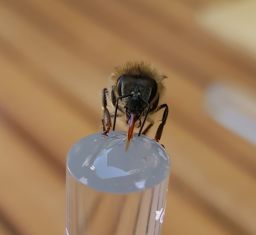Ah, the wee but mighty honeybee – lauded more for its indefatigable work ethic than its ability to add and subtract. But the pollinator is smarter than its size suggests.
Bees have already proven they can count up to 4 and learn some basic arithmetic. Now new findings published in the Journal of Experimental Biology suggest they can compute even higher numbers – if they know they’ll be penalized for the wrong answer.
Lead author Scarlett Howard trained 22 honeybees that were randomly collected from 25 hives in Toulouse, France. They were split into two groups and taught to enter a Y-shaped maze and choose between two options, one right and one wrong.

The correct answer always had four shapes, and the incorrect one could feature anywhere from one to 10 shapes.
Both groups were trained to choose the image with four shapes, but while one group received a reward of sucrose for the right answer and neither punishment nor reward for choosing incorrectly, the other group received a bitter dose of quinine for the wrong answer, effectively punishing the bee and raising the stakes.
More impressively, the bees who knew about the quinine consequence correctly chose the four-shape image when paired with a five-shape image 59% of the time, despite the tricky distinction.
Bees pay more attention when there’s potential for punishment
Like humans, bees are more likely to make right choices when motivation is high.
Howard wrote that the bees who were punished for making incorrect choices made more of the right ones, likely because the presence of punishment upped the incentive.
The other group, meanwhile, paid less attention to the images because the penalty was so low – the reward wasn’t as motivating.
Their ability to discriminate numbers is on par with African grey parrots, dolphins and guppies, among others, Howard wrote. This is evidence that even insects are capable of complex tasks.
